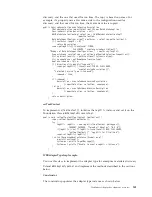
v
PropertyGroup
– A collection of properties including single and multi types and
PropertyGroup
itself. For example,
OutboundConnectionConfiguration
allows
three property groups in one Main property group:
UserConfiguration
that
includes
Username
and
Password
;
MachineConfiguration
that includes
Hostname
and
PortNo
; and
Miscellaneous
that includes other properties such as
Prefix
and
DirectoryName
.
v
PropertyChangeListener
– Used when a property change affects some other
property or property group. This can be associated to any property or a property
group. Each property can, in turn, have associated listeners that it can notify
when a change happens. For example, Property A default value must change
when Property B’s value changes. Accordingly, the
PropertyChangeListener
that
references Property A will be added to the listener list for Property B. When
property B is changed in the set method,
propertyChange
can be fired on all
listeners in the list. This will lead to changes in Property A.
v
PropertyChangeEvent
– An event that would be passed when
propertyChange
is
fired on
PropertyChangeListener
. It includes the type of change, such as
PROPERTY_VALUE_CHANGE
,
PROPERTY_ENABLED
,
PROPERTY_DISABLED
,
PROPERTY_VALID_VALUES_CHANGE
,
OLD_VALUE
,
NEW_VALUE
, and
SOURCE_OF_CHANGE
.
v
TableProperty
A property representing a table with rows and columns. Each
column is represented by the PropertyDescriptor instance and each cell
corresponding to a given row and column is represented by a
SingleValuedProperty implementation.
v
TreeProperty
A property representing a tree of selectable nodes. Each node is
represented by a NodeProperty implementation which can be selected,
highlighted and can have configuration properties represented by a
PropertyGroup instance.
Enterprise metadata discovery implementation samples
The code samples in this section are from the TwineBall sample enterprise
metadata discovery implementation.
For the precise class structure and additional information, refer to the code for the
TwineBall enterprise metadata discovery implementation that is delivered with the
WebSphere Adapter Toolkit.
Logging and Tracing:
This describes the logging and tracing implementation for enterprise metadata
discovery.
Use the
WBIMetadataDiscoveryImpl.getLogUtils()
call to acquire an
LogUtils
instance. Then use the appropriate method to perform logging and tracing.
Property group sample:
Use the property group APIs to create property groups required for an enterprise
metadata discovery implementation.
To enable validation of specific properties, extend the
WBISingleValuedPropertyImpl
or
WBIMultiValuedPropertyImpl
and then implement
the
vetableChange()
method. Any validation can be performed in this code. In
case of failures,
PropertyVetoException
must be thrown.
138
WebSphere Adapters: WebSphere Adapter Toolkit User Guide
Summary of Contents for WebSphere Adapters
Page 2: ......
Page 6: ...iv WebSphere Adapters WebSphere Adapter Toolkit User Guide...
Page 220: ...214 WebSphere Adapters WebSphere Adapter Toolkit User Guide...
Page 224: ...218 WebSphere Adapters WebSphere Adapter Toolkit User Guide...
Page 225: ......
Page 226: ...Printed in USA...
















































